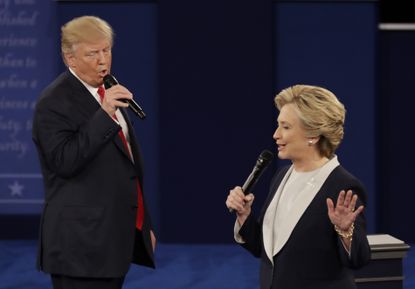The foreign policy disaster of the second presidential debate
Has anyone learned anything from the last decade of failure?


The second presidential debate of the 2016 general election was a humiliating, awkward disaster zone that will get traveling Americans jeered in foreign bars for the next two decades at least. The overwhelming reason, of course, was Donald Trump, who responded to a question about how he boasted about sexually assaulting women by changing the subject to ISIS, admitted he had used a nearly $1 billion loss to avoid paying taxes for years, and said that if he were president, Hillary Clinton would be "in jail."
The most coherent section of the debate was, rather surprisingly, on foreign policy. Unfortunately, it was still a comprehensive disaster — from the choice of question to the answers from both candidates.
The only real foreign policy question was about the humanitarian crisis in Syria, focusing on whether the United States is doing enough to stop it. The frame is extremely typical for an American foreign policy discussion — not a question of whether to use military force, but a question of how much military force is appropriate, with a strong presumption that more is better.
Subscribe to The Week
Escape your echo chamber. Get the facts behind the news, plus analysis from multiple perspectives.

Sign up for The Week's Free Newsletters
From our morning news briefing to a weekly Good News Newsletter, get the best of The Week delivered directly to your inbox.
From our morning news briefing to a weekly Good News Newsletter, get the best of The Week delivered directly to your inbox.
Equally telling was what wasn't mentioned: the ongoing U.S.-backed Saudi war on Yemen. For a year and a half now, Saudi Arabia has been ripping Yemen to shreds with a blockade and military intervention using U.S. weapons, causing probably the worst humanitarian crisis in the world. On Saturday, a Saudi airstrike struck a large funeral procession in the capital Sana'a, killing more than 100 people and igniting furious protests throughout the country. The U.S. quickly announced that it would review its support policy, which might end the war at a stroke.
Given that this happened literally the previous day, it's simply malpractice not to get the candidates on the record about it.
As for the actual Syria question, Trump's bizarro instincts often serve him best in foreign policy, and as usual he stumbled onto one decent line of argument here. This time he rightly criticized the U.S. tendency for arming rebel groups to go awry. This indeed has been a major problem for President Obama, and for many others before him.
But this was drastically undercut by Trump's subsequent argument that because Syria's Bashar al-Assad and Russia are (together with Iran) fighting ISIS, the U.S. should effectively align with that faction to defeat the common enemy. Now, while peaceful relations must be pursued with any nation that has thousands of nuclear weapons, and Assad will probably have to be part of any negotiated ceasefire, that is a frankly preposterous suggestion. Aligning with a brutal, highly unstable dictatorship is going to create as many problems as it solves. Better by far to avoid direct involvement, and defeat ISIS with a containment strategy.
Clinton, for her part, erred in the other direction, displaying her usual hawkishness by suggesting a no-fly zone is needed in Syria, and arguing America should start arming Kurdish forces. The Kurds have been very reliable proxies, but they need help with engaging Turkey diplomatically more than they need weapons, and a no-fly zone risks inciting further Russian escalation.
She did argue that American troops should not be used in Syria, because they would end up "holding territory," an untenable situation. However, she went on to immediately endorse the use of special forces units in Syria, which are presumably still troops.
At any rate, neither Clinton nor Trump nor anybody else brought up the single most important foreign policy danger: the risk of excessive force. Neither candidate spoke intelligently about the risk of getting dragged into Syria through slow escalation, nor the general lessons that might be learned from Iraq, Libya, Vietnam, or Yemen.
I must emphasize that I'm not drawing an equivalence here. By every imaginable metric, Clinton gave a far superior performance. While I strongly disagree with her foreign policy beliefs, it's inarguable that she is an ordinary American politician, substantially more hawkish than President Obama but not so much as his predecessor. Trump, meanwhile, is a maniac who outright threatens to jail his political opponent, and gives every sign of using the military to settle personal grudges. A person that childish and unstable simply cannot be in charge of the world's most powerful military.
Sign up for Today's Best Articles in your inbox
A free daily email with the biggest news stories of the day – and the best features from TheWeek.com
Ryan Cooper is a national correspondent at TheWeek.com. His work has appeared in the Washington Monthly, The New Republic, and the Washington Post.
-
 US election: who the billionaires are backing
US election: who the billionaires are backingThe Explainer More have endorsed Kamala Harris than Donald Trump, but among the 'ultra-rich' the split is more even
By Harriet Marsden, The Week UK Published
-
 US election: where things stand with one week to go
US election: where things stand with one week to goThe Explainer Harris' lead in the polls has been narrowing in Trump's favour, but her campaign remains 'cautiously optimistic'
By Harriet Marsden, The Week UK Published
-
 Is Trump okay?
Is Trump okay?Today's Big Question Former president's mental fitness and alleged cognitive decline firmly back in the spotlight after 'bizarre' town hall event
By Harriet Marsden, The Week UK Published
-
 The life and times of Kamala Harris
The life and times of Kamala HarrisThe Explainer The vice-president is narrowly leading the race to become the next US president. How did she get to where she is now?
By The Week UK Published
-
 Will 'weirdly civil' VP debate move dial in US election?
Will 'weirdly civil' VP debate move dial in US election?Today's Big Question 'Diametrically opposed' candidates showed 'a lot of commonality' on some issues, but offered competing visions for America's future and democracy
By Harriet Marsden, The Week UK Published
-
 1 of 6 'Trump Train' drivers liable in Biden bus blockade
1 of 6 'Trump Train' drivers liable in Biden bus blockadeSpeed Read Only one of the accused was found liable in the case concerning the deliberate slowing of a 2020 Biden campaign bus
By Peter Weber, The Week US Published
-
 How could J.D. Vance impact the special relationship?
How could J.D. Vance impact the special relationship?Today's Big Question Trump's hawkish pick for VP said UK is the first 'truly Islamist country' with a nuclear weapon
By Harriet Marsden, The Week UK Published
-
 Biden, Trump urge calm after assassination attempt
Biden, Trump urge calm after assassination attemptSpeed Reads A 20-year-old gunman grazed Trump's ear and fatally shot a rally attendee on Saturday
By Peter Weber, The Week US Published


